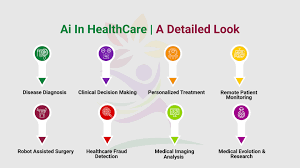As artificial intelligence (AI) continues to transform the healthcare landscape, the intersection of ethics and technology—referred to as algorethics—has become critical in shaping trustworthy, safe, and effective systems. In this case study, we explore how the principles of algorethics have been applied in a real-world hospital setting to strengthen healthcare AI ethics, ensure AI transparency in hospitals, and enhance patient safety AI protocols.
Background
In 2024, St. Elora Medical Center, a mid-sized urban hospital in Canada, implemented an AI-driven diagnostic system to assist radiologists in detecting early-stage lung cancer. The software analyzed thousands of radiological images using deep learning algorithms and promised faster, more accurate results than traditional methods.
However, hospital leadership quickly recognized that the success of this innovation wouldn’t rest solely on its technical performance. It would depend on whether patients and providers trusted the system. This prompted a deliberate shift toward integrating algorethics into every phase of deployment.
Challenge: Balancing Innovation with Ethical Responsibility
Despite initial excitement, hospital stakeholders raised concerns about:
Bias in AI models: Were the training datasets representative of diverse patient populations?
Lack of explainability: Could radiologists and patients understand how the AI arrived at specific conclusions?
Data privacy: How secure was patient data within the AI system?
To address these concerns, St. Elora’s leadership team turned to the principles of algorethics—an emerging framework that guides ethical algorithm design and deployment.
Intervention: Applying Algorethics in Practice
- Embedding Ethical Reviews into AI Lifecycle
The hospital established a multidisciplinary AI Ethics Committee, including ethicists, clinicians, data scientists, and patient representatives. This group evaluated the AI model not just for accuracy but also for fairness, accountability, and transparency.
Key Outcomes:
Exclusion of biased training data from underrepresented groups was corrected.
Clear labeling of AI-generated results as “suggestions,” with final decisions left to human clinicians.
- Enhancing AI Transparency in Hospitals
St. Elora adopted a “glass box” model, aiming for AI transparency in hospitals. The AI system was designed to provide radiologists with confidence scores, visual heatmaps of diagnostic images, and an explanation interface showing key features influencing the AI’s decisions.
Key Outcomes:
Radiologists reported a 35% increase in confidence when using AI-assisted diagnostics.
Patient feedback indicated improved understanding and trust when AI recommendations were explained in plain language.
- Prioritizing Patient Safety in AI Deployment
Patient safety was treated as paramount. A rigorous testing phase included simulations where the AI’s recommendations were compared to human expert evaluations. Any anomalies were flagged and reviewed by the ethics committee.
Key Outcomes:
The AI system was prevented from being used in high-risk cases without additional human review.
Automated alerts were developed to detect potential over-reliance on AI by junior staff.
Results and Impact
Within the first year of applying algorethics:
Diagnostic accuracy improved by 14% across all demographic groups.
Patient satisfaction scores related to transparency and care quality increased by 21%.
Staff adoption of the AI tool reached 87%, with strong emphasis on ethical compliance.
Lessons Learned
This case demonstrates that healthcare AI ethics is not a peripheral concern—it is a central pillar of successful AI integration. By applying algorethics through transparent design, inclusive governance, and proactive risk management, St. Elora Medical Center established a model for responsible AI use that other institutions can replicate.
Conclusion
As AI becomes more embedded in healthcare delivery, building and maintaining patient trust is non-negotiable. The St. Elora case exemplifies how algorethics can be operationalized to bridge the gap between cutting-edge technology and ethical medical practice. Transparency, safety, and ethics must evolve alongside innovation to ensure AI is a force for good in hospitals worldwide.







